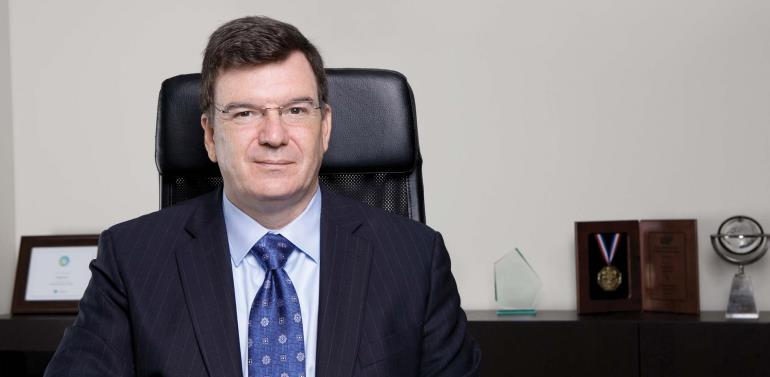Uncategorized
Miraah will be one of the largest solar plants ever built: Rod MacGregor

[rev_slider alias=”Rod MacGregor”]
‘Solar EOR offers a compelling economic solution to any country producing heavy oil that has limited natural gas resources but enjoys abundant sunshine,’ says Rod MacGregor, President and CEO, GlassPoint Solar. Excerpts of an interview with him:
What are the key features of Miraah project? What is the current status?
Miraah, which we are building for our partner Petroleum Development Oman (PDO), will be one of the largest solar plants ever built in history. The 1GW solar thermal project will harness the sun’s clean energy to produce steam used in thermal Enhanced Oil Recovery (EOR) at the Amal oilfield in South Oman. The steam Miraah will produce will provide a significant portion of the field’s requirements, which will reduce PDO’s reliance on using natural gas to generate steam. Once Miraah is completed, it will take an average of 6,000 tons of water daily and convert it into steam for oil production. This will save 5.6 trillion British Thermal Units (BTUs) of natural gas each year, the equivalent of the amount of gas that could be used to provide residential electricity to 209,000 people in Oman. The project is also expected to reduce CO2 emissions by over 300,000 tons annually which corresponds to taking 63,000 cars off the road permanently. And this is only one project – Imagine what could be done by deploying similar projects all over the world.
Work on Miraah has been progressing well since the project was announced last summer. We successfully broke ground in November and recently completed site grading three months ahead of schedule. Miraah’s glasshouses will be built in modular format, which enables us to construct them quickly. We are on track to produce steam from the first glasshouse in 2017. Upon completion, the site will be huge and the total project area will span three-square kilometres, an area equivalent to more than 360 football pitches. We’re now starting on the foundation work, and will be drilling 5,000 holes for the support beams for the glasshouse structures.
Has there been any delay/change to the project as a result of the low oil price environment? Do you think the project remains commercially feasible despite the expected low oil prices in the coming years?
The project plan has not changed. In fact, Miraah is already ahead of schedule. We have completed the site grading along with our partners with zero Lost Time Injuries. People might assume that a project such as Miraah is no longer feasible in light of low oil prices, but on the contrary, low oil prices triggers oil producers to look for cheaper means to generate the energy they need to fuel their own operations. That’s exactly what GlassPoint offers.
When oil prices are high, producers pay less attention to operating costs and more on increasing production. Whereas in times of lower oil prices such as those we are experiencing today, oil companies worldwide are looking at lowering production costs. In a typical heavy oil field, fuel purchase for steam generation makes up 60 per cent of the operating cost of the field. By deploying solar, operators can reduce their gas consumption by up to 80 per cent, substantially reducing operating cost. The gas saved can be exported as LNG generating new revenue or used for power generation or feedstock for new industries, which would further stimulate the economy and generate jobs. There is truly no better time for solar and oil to work together to reduce costs and achieve long-term energy goals.
What are the timelines for the project’s execution?
Miraah is currently ahead of its construction schedule, with steam from the first glasshouse expected in 2017. Full completion will come in the years that follow in line with PDO’s field developments and Amal steam requirements.
What are the expected ICV benefits that Miraah offers to Oman?
Miraah has the potential to generate significant value for Oman, creating new opportunities in supply chain development, manufacturing capability, employment and training. GlassPoint steam generators are made of raw materials readily available in the Sultanate, including aluminium and steel, allowing almost 80 per cent of the supply chain to be sourced locally.
Developing a local Omani workforce and job opportunities for local contractors and small business is part of GlassPoint’s and PDO’s commitment to In-Country Value (ICV). Miraah’s site grading was performed by a Local Community Contractor (LCC) owned and operated by Omanis that live in the communities surrounding the Amal field. They will continue to handle some of the construction work as the project progresses. While our agreement with PDO stipulates the allocation of 10 per cent of our project work to LCCs, we aspire to go above and beyond this goal in order to create a positive impact on Oman and its people.
-

 Banking & Finance2 months ago
Banking & Finance2 months agoOman Oil Marketing Company Concludes Its Annual Health, Safety, Environment, and Quality Week, Reaffirming People and Safety as a Top Priority
-

 News2 months ago
News2 months agoJamal Ahmed Al Harthy Honoured as ‘Pioneer in Youth Empowerment through Education and Sport’ at CSR Summit & Awards 2025
-

 OER Magazines2 months ago
OER Magazines2 months agoOER, December 2025
-

 News2 months ago
News2 months agoAI Security Conference 2025 Hosted by Securado Highlights the Changing Cybersecurity Landscape
-

 Insurance1 month ago
Insurance1 month agoSupporting Community Wellness: Liva Insurance Sponsors Muscat Marathon 2026 with Free Health Checkups
-

 Interviews1 month ago
Interviews1 month agoEXCLUSIVE INTERVIEW: TLS Rebranding Marks Strategic Leap Toward Innovation, Sustainability & Growth
-

 Insurance4 weeks ago
Insurance4 weeks agoLiva Insurance Supports Community Wellness Through “Experience Oman – Muscat Marathon 2026”
-

 Investment2 weeks ago
Investment2 weeks agoLalan Inaugurates Its First Overseas Manufacturing Facility, Marking Sri Lanka’s First Investment in SOHAR Freezone






























You must be logged in to post a comment Login